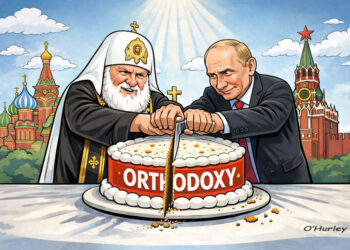by Miceál O’Hurley
Diplomatic Editor
KYIV & BRUSSELS– All across the contact line in Donbas and in Crimea, and further along Ukraine’s border with Russia, Putin has deployed the largest combat-ready military build-up since Russia invaded Eastern Ukraine and Crimea in 2014. For the past two weeks social media has been flooded with photographs documenting trains carrying tanks and armoured personnel carriers rolling towards Ukraine’s border, long motorised columns and tactical aircraft re-deployment. Civilian satellite sites have also verified what military analysts have concluded is an increase of at least 80,000 combat troops, replete with logistical support for sustained operations, amassed as yet another direct threat to Ukraine.
Putin Seems Intent on Threatening War
Moscow’s deployment of such a large number of combat troops and equipment, conspicuously configured for the very type of combat necessary to conquer one’s neighbour, goes well beyond Russia’s constant breaches of the 2020 Ceasefire agreed between Russia and Ukraine that still leaves Ukrainians dead on an almost daily basis. The United States European Command (EUCOM) raised its threat level from ‘possible crisis’ to ‘imminent threat’ on 31 March 2021, based upon Russia’s latest, overt provocations. NATO has also increased its readiness stature given Russia’s mass troop deployments.
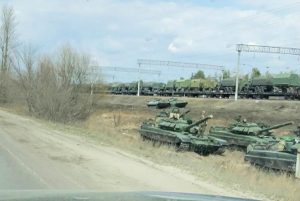
Russia’s President, Vladimir Putin, is also challenging the West to determine their readiness, willingness and commitment to help defend Ukraine from further Russian aggression and possible occupation. Concurrently with the massive troop build-up specifically threatening Ukraine, NATO fighter jets were forced to engage Russian warplanes in 10 different intercepts on a single day probing everywhere from the Arctic to southern Europe. NATO described Russia’s tactic of threatening air incursions as “an unusual peak” of flights. Allied aircraft shadowed Russian bombers and fighters over the North Atlantic, North Sea, Black Sea and Baltic Sea, all at one time, according to NATO reports.
Between 2 April – 5 April 2021, the Organisation for Security and Cooperation in Europe (OSCE) recorded 1,424 distinct ceasefire violations, an alarming number as the same period last year daily averaged just over five.
What is Putin’s End Game?
Analysts are decidedly split on Putin’s goals. Some analysts believe Putin is simply seeking to cause headaches for US President Joe Biden who only last month called Putin a “killer’ in a widely broadcast interview later made viral on social media around the world. Aside from starting the only war on European soil since WWII by invading Eastern Ukraine and attempting to illegally annex Crimea, Putin has become an existential threat to all former Soviet Republics as well as Western Europe and the United States.
With a seemingly unceasing litany of bad acts, Russia stands credibly accused of carrying out murders by the poisoning of Europeans, executing an asylum seeker in a German park, conducted cyber-espionage against its neighbours, invaded and occupied parts of Georgia, Moldova and Ukraine, attempting to illegally annex Crimea, orchestrating the attempted murder of foreign politicians, jailing dissident Russians critical of the regime after attempting to poison them with the banned nerve agent Novichok and shooting down a civilian airliner over Ukraine killing 283 innocent children, women and men. The list is endless.
Understandably, other analysts believe Putin, who is suffering significant domestic criticism for his heavy-handed approach to dissidents such as Alexei Navalny who was imprisoned after a poisoning attempt on his life failed, and the generally dismal state of the Russia economy and crumbling infrastructure that makes rural Russia look more like the pre-industrial state Stalin once reigned over, may attempt to use invasion and annexation as a means to consolidate his hold over the Russian people and relieve his failed economy. As the Atlantic Council observes, Putin may be exercising his tried-and-true KGB playbook to “…threaten action, keep options open and your adversaries off balance, and exploit opportunities that may arise.”
Ploy of Protecting Russians
Putin has long made clear his intention to “protect” Russians who found themselves outside of Russia after the fall of the Soviet Union. The invasion and attempted illegal annexation of temporarily occupied Crimea and the conflict raging in Donbas are prime examples. In both cases, Putin claims he was moving to protect ‘Russians’. Few give such claims any credibility. Since 2014, Putin has moved thousands of Russians into Crimea, displacing Ukrainians forced to flee, or that have ‘disappeared’ or been jailed by Russia, including indigenous Tatars, to create a decidedly pro-Russian population. Such actions are specifically prohibited as gross violations of international law and live in modern European memory as being tantamount to Adolf Hitler’s Lebensraum policy.

In both Crimea and Donbas, Russia has initiated a policy of denying services, access to education and honouring even the most basic of rights to Ukrainians that do not accept a Russian passport which has almost been made obligatory in temporarily occupied regions of Ukraine. Again, contrary to international law, Russia has coercively issued almost 1 million Russian passports to Ukrainians in a thinly veiled attempt to in-turn claim they are Russians in need of protection. All this provides Putin with spurious reasoning to act with military force for the ‘protection of Russians’, despite being coerced into holding Russian passports. The EU has decidedly taken a stance not to honour such passports given they were issued under such illegal conditions.
Moscow’s ‘Blame Game’ Disinformation Campaign
Despite Russia deploying their Spetsnaz (Special Forces), stripped clean of insignia or markings as being Russian military, during the invasion and occupation of Eastern Ukraine, Russia has consistently engaged in propaganda and disinformation campaigns to blame, alternatively, Ukraine, the European Union, the United States and Great Britain for the conflicts. In the past two weeks Moscow has alternatively claimed the massive build-up of combat forces on the Ukrainian border and in temporarily occupied Crimea to be a ‘pre-announced military exercise’ then contrary to such claims, decidedly blamed Ukraine and the West for provocative conduct and still further, alternatively claimed the forces may be needed to protect those they dubiously claim to be ‘Russians’ in Eastern Ukraine and Crimea.
In one of the most galling and self-serving exercises of victim blaming, Russian Deputy Foreign Minister, Sergei Ryabkov, told the Russian news agency Tass, “We maintain contacts with the Americans. It is done at a high level. The Americans tell us about their concerns,” he said. “They should better be concerned not about Russia’s actions but rather about Kiev’s [Kyiv’s] inadmissible behavior, as it not only dodges implementation of the Minsk Package of Measures but rejects these agreements in an ever provoking manner. If our American colleagues attend to this problem, it will really help stabilize the situation. And we are doing what we think necessary on our Russian territory. And no American signals have anything to do with that. I would say, we totally ignore these signals,” he added.
Others senior Moscow officials support and echo this false narrative. In a statement wildly reminiscent of Hitler’s bogus claims that supposed aggressions on the part of Polish forces necessitated Nazi Germany’s invasion of Poland in 1939 (actually carried-out by German special forces wearing Polish uniforms to provide a false justification), Kremlin spokesman Dmitry Peskov claimed, “… provocations by the Ukrainian armed forces do take place,” adding, “… there have been many of them.”
Pioneering the age of ‘Hybrid Warfare’ in which actual combat forces are assisted with media manipulation, State propaganda and decidedly grotesque misinformation campaigns, Russia has still managed to have a seat at the table with other European leaders, albeit being banished from the former G8 and temporarily excluded from PACE. If it is considered that more than 13,000 Ukrainians have been killed since Russia’s invasion of Eastern Ukraine and attempted illegal annexation of temporarily occupied Crimea in 2014, the poisonings and murders of Moscow’s opponents, the murder of the innocents aboard civilian flight MH17 which Russia shot-down using a BUK missile – Russia is arguably responsible for more European deaths than all other terrorists or terrorist-groups combined over the last decade. Still, Putin is treated as a head-of-state and not the sponsor of death and State occupation of parts of Georgia, Ukraine and Moldova over which he presides.
Ukrainian President Volodymyr Zelenskyy Shows Remarkable Resolve
In an overt act of courage and resolve not seen from a head of state since Sir Winston Churchill personally visited the battlefront, braving enemy fire during the invasion of France to liberate Europe, President Zelenskyy visited the trenches that make up the more than 500 kilometre contact line in Eastern Ukraine’s Donbas. Throughout his lengthy visit Russian sniper fire and the occasional Russian artillery fire was easily heard on cameras recording the visit. CNN accompanied Zelenskyy during the remarkable visit.
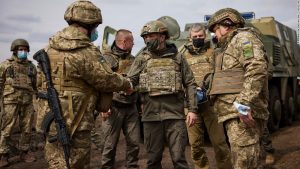
Zelenskyy’s visit not only bolstered the front-line troops protecting not only Ukraine, but arguably Europe from Russian aggression, but sent a clear signal that Ukraine would not shrink from whatever danger posed by Russia to defend itself and see its internationally recognised borders restored. CNN journalists accompanied Zelenskyy during his visit to the trenches, documenting the uplifting effect it had on the Ukrainian soldiers defending their homeland, but demonstrating the personal risk to which he exposed himself owing to Russian snipers, enemy combatants and artillerymen sustained by more than 2,000 Russian advisors, who collectively and routinely violate the existing cease fire.
Russia continues to deny OSCE monitors meaningful access to areas necessary to confirm Russian violations of the cease fire or visit Ukrainians forcibly held by militants in Donbas. The International Criminal Court is now pursuing what they deemed to be credible reports of war crimes and human rights violations in occupied Ukraine.
Ukraine Prevails Through Diplomacy
The European Union, the United Nations, the United States and others have stood firmly on the side of international law and peace by imposing sanctions on Russia for their invasion of Ukraine and attempt to illegally annex temporarily occupied Crimea in 2014. Despite its might, Russia and its Foreign Minister, Sergey Lavrov, have failed to convince others that Russia is acting justly or otherwise in accordance with international law.
Russia has become a virtual pariah on the international stage, not only for its aggression against Ukraine, Georgia and Moldova in Europe, or for its murder of Europeans and asylum seekers on EU soil, relentless cyber-attacks against European democracies and the US, but for its continuing support for the brutal regime in Syria which was deemed to have used prohibited chemical weapons against civilians in Saraqib as reported by the Organisation for the Prohibition of Chemical Weapons (OPCW). Russia’s willingness to use chemical weapons against its own citizens, such a Alexander Litvinenko, Sergei and Yulia Skripal and Alexei Navalny (amongst others), as well as assisting Syria who used prohibited chemical weapons in attacks upon civilian non-combatants, demonstrates that Russia is not acting like a State as understood by international conventions and law.
Not beyond purposefully provoking Europe, during a February 2021 visit to Moscow by European High Representative Josep Borrell, the EU’s chief diplomat, Lavrov, accused EU leaders of ‘lying’ about the poisoning of Russian opposition figure Alexei Navalny and called the bloc an ‘unreliable partner.’ In a further deliberate insult to Borrell, in a diplomat slight intended to be noticed, following a long working-luncheon with Lavrov, Borrell was left to learn from a Tweet, along with the rest of the world, that Russia had expelled three EU diplomats – one each from Germany, Sweden and Poland – for attending demonstrations in support of Navalny. To further demonstrate Moscow’s contempt for the EU, Borrell’s demand for explanations for the diplomatic expulsions and a reversal of the expulsion order went entirely ignored by Lavrov.
Contrary to Lavrov’s insults to anyone who disagrees with the Kremlin, and Russia’s utter inability to convince the world community that Russia is acting reasonably, Ukraine’s Foreign Minister, Dmytro Kuleba, has gone from strength-to-strength. Kuleba has deftly built a solid base of support for Ukraine’s defence and eventual justification of its international borders, including the return of temporarily occupied Crimea. From convincing the US to ship tank-killing Javelin missiles to Ukraine (something the Obama Administration declined to do), to coordinate training exercises with the United Kingdom and the United States as well as other allies, to ensuring sanctions remain robust (if not expanded), Kuleba has prevailed and is now recognised as the superior diplomat to his belligerent Russian counterpart.
Most recently, the Zelenskyy-Kuleba team thwarted attempts by Putin-Lavrov to hold substantive talks with Germany and France about the future of Ukraine without Ukraine being at the table. Such a tactic was last employed in 1938 by Nazi Germany to decide the fate of Czechoslovakia being annexed to Nazi Germany through the Munich Accord – a perverse act of appeasement without the Czechs being represented at the talks which led to WWII. Ukraine has come into its own at a time of great peril, militarily and diplomatically even in the face of enduring threat by their Russian neighbour bent on domination and flouting international law.
G7 Demands Russia ‘Cease Provocations’
The G7 group of countries (formerly the G8 before Russia was expelled), called upon Russia to de-escalate on Monday, 12 April 2021. The G7 Foreign Ministers (Canada, France, Germany, Italy, Japan, the UK, and the US), plus the High Representative of the European Union, indicated they were “deeply concerned” about Russia’s belligerence and called upon Putin to “cease its provocations and to immediately de-escalate tensions.”
In an unequivocal statement, the G7 Foreign Ministers said, “These large-scale troop movements, without prior notification, represent threatening and destabilising activities,” said the G7 foreign ministers in a statement. “We reaffirm our unwavering support for the independence, sovereignty and territorial integrity of Ukraine within its internationally recognised borders” the statement continued.
US Secretary of State Blinken in Brussels to Support Ukraine
US Secretary of State Antony Blinken visited Brussels on Tuesday, 13 April 2021, for urgent consultations with his European counterparts and NATO allies. The unilateral build-up of Russian military forces threatening Ukraine dominated the talks. Notably, US Secretary of Defense, Lloyd Austin, a former combat-experienced General Officer, accompanied Blinken.
Blinken made clear the Biden Administration’s resolve not to allow Russia to attempt to further expand its influence by armed force, pointedly warning, “There will be consequences.”
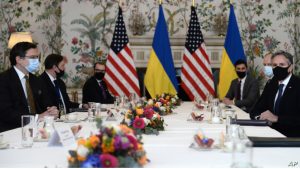
In yet another clear demonstration of the West’s commitment to Ukraine, Blinken held lengthy consultations with his Ukrainian counterpart, Kuleba, at the US Chief of Mission’s residence in Brussels. Following the consultation, Blinken and Kuleba addressed the media with Kuleba saying, “It is, I think, a good symbol that we are meeting here in Brussels on the margins of the NATO events and the meetings because it once again reinforces a very simple message that Euro-Atlantic countries, they stand by Ukraine in its difficult situation. And Ukraine stands by the principles and values of the Euro-Atlantic community.”
Blinken was equally as steadfast in his support of Ukraine, “I am very, very glad for this chance to meet with Foreign Minister Kuleba. We’ve – this is our first opportunity to meet in person. We’ve spoken on the phone on several occasions. In fact, President Biden has spoken with President Zelenskyy as well. And I just wanted to reiterate what I’ve said to the foreign minister, and even more importantly, President Biden said to President Zelenskyy, which is the United States stands firmly behind the sovereignty and the territorial integrity of Ukraine. And I’m here to reaffirm that with the foreign minister today. And that’s particularly important at a time when we’re seeing, unfortunately, Russia take very provocative action when it comes to Ukraine. We’re now seeing the largest concentration of Russian forces on Ukraine’s border since 2014, and that is of deep concern not only to Ukraine, but to the United States, and indeed to many of our allies and partners. The foreign minister just came from a session with NATO and I’ll be consulting with our close NATO allies and partners in the days ahead about the situation.”
A transcript of the statements of Blinken and Kuleba can be read here.
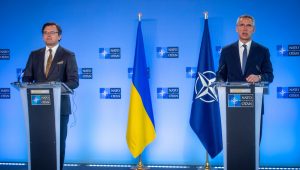
NATO Rebuke’s Russia’s Attempt to Restrain Ukrainian NATO Membership Bid
Kuleba also engaged in constructive talks with NATO Secretary-General Jens Stoltenberg during the Brussels consultations. Sending a signal to Russia that Moscow is not the master of their neighbour’s futures, Stoltenberg made Ukraine’s ascension to NATO members a matter outside of Russia’s control, “It is for the 30 NATO allies to decide when Ukraine is ready for membership. No one else has any right to try to meddle or to interfere in that process.” Stoltenberg was speaking at a news conference alongside Kyiv’s top diplomat, Kuleba. “Russia is now trying to re-establish some kind of sphere of influence where they try to decide what neighbours can do,” Stoltenberg added.
German Chancellor Condemns Russian Build-Up
German Chancellor Angela Merkel, who has been a key player in attempts to find a diplomatic solution through the so-called ‘Normandy Format Meetings’ condemned the Russian troop build-up and called for the Russia troop reinforcements to be withdrawn.
Following a telephone call between Merkel and Putin the Kremlin released a statement, “Vladimir Putin noted provocative actions by Kyiv which is deliberately inflaming the situation along the line of contact.”
At present, Russia remains recalcitrant, refusing to de-escalate the situation and endures in a campaign of deflection complaining alternatively that it is a simply military exercise, that they are only acting to protect Russians or that Ukraine is acting provocatively – a continuation of the dissembling Russo-phobic invocation routinely employed to deny responsibility for their own acts.















































